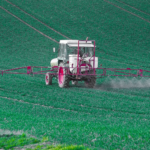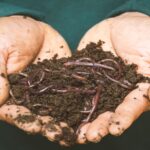Indoor plants bring life, color, and a touch of nature into our homes, turning ordinary spaces into vibrant green sanctuaries. Yet many plant lovers quickly discover a common challenge: pests. In the warm, enclosed environment of a home, insects like spider mites, mealybugs, aphids, and fungus gnats can spread rapidly, often going unnoticed until leaves […]
10 pesticides toxic to neurons involved in Parkinson’s
Researchers at UCLA Health and Harvard have identified 10 pesticides that significantly damaged neurons implicated in the development of Parkinson’s disease, providing new clues about environmental toxins’ role in the disease. While environmental factors such as pesticide exposure have long been linked to Parkinson’s, it has been harder to pinpoint which pesticides may raise risk […]
Small streams in agricultural ecosystems are heavily polluted with pesticides
Pesticides safeguard agricultural yields by controlling harmful insects, fungi, and weeds. However, they also enter neighbouring streams and damage the aquatic communities, which are crucial for maintaining biodiversity, are part of the food web and support the self-purification of water. In a nationwide monitoring programme, a consortium of scientists led by the Helmholtz Centre for […]
New Soil Study Shows Pesticides ‘Destroying the Very Foundations of Web of Life’
A study published Tuesday in the journal Frontiers in Environmental Science bolsters alarm about the role that agricultural pesticides play in what scientists have dubbed the “bugpocalypse” and led authors to call for stricter regulations across the U.S. Researchers at the University of Maryland as well as the advocacy groups Friends of the Earth U.S. and the Center for […]
DDT exposure in grandmothers linked to obesity, earlier periods in granddaughters
In the first study to report on the health effects of exposure to a toxic environmental chemical over three human generations, a new study has found that granddaughters whose grandmothers were exposed to the pesticide DDT have higher rates of obesity and earlier first menstrual periods. This may increase the granddaughters’ risk for breast cancer […]
Whitewash: The Story of a Weed Killer, Cancer, and the Corruption of Science
It’s the pesticide on our dinner plates, a chemical so pervasive it’s in the air we breathe, our water, our soil, and even found increasingly in our own bodies. Known as Monsanto’s Roundup by consumers, and as glyphosate by scientists, the world’s most popular weed killer is used everywhere from backyard gardens to golf courses to millions […]
Study uncovers cause of pesticide exposure, Parkinson’s link
A new University of Guelph study has discovered why exposure to pesticides increases some people’s risk of developing Parkinson’s disease. Previous studies have found an association between two commonly used agrochemicals (paraquat and maneb) and Parkinson’s disease. Now U of G professor Scott Ryan has determined that low-level exposure to the pesticides disrupts cells in […]
Commercial pesticides: Not as safe as they seem
New regulations are needed to protect people and the environment from toxic pesticide ingredients that are not currently subject to safety assessments. This is the conclusion of the first comprehensive review of gaps in risk assessments for “adjuvants” — ingredients added to pesticide formulations to enhance the function or application of the active ingredient. Ignoring […]
Wild birds opt for conventional food over organic, study shows
The nutritional benefits of organic food have been called into question by new research which shows wild garden birds prefer conventional seed to that which has been organically- grown. A three-year study by Newcastle University has found that wild birds are not swayed by the organic label, but instead prefer the more protein-rich, conventional food […]
Pesticides and food scarcity dramatically reduce wild bee population
The loss of flowering plants and the widespread use of pesticides could be a double punch to wild bee populations. In a new study, researchers at the University of California, Davis, found that the combined threats reduced blue orchard bee reproduction by 57 percent and resulted in fewer female offspring. The study was published in […]









